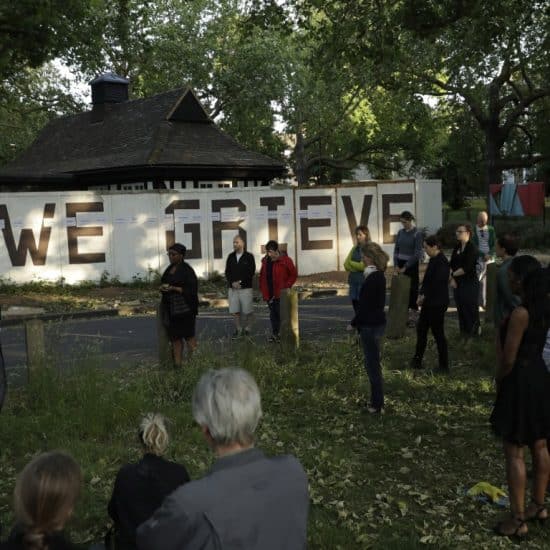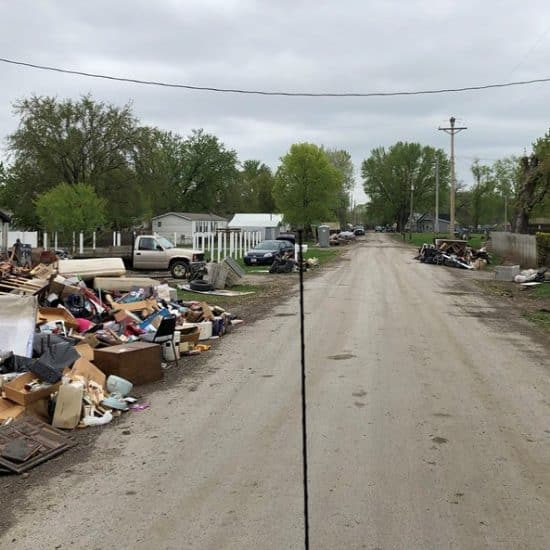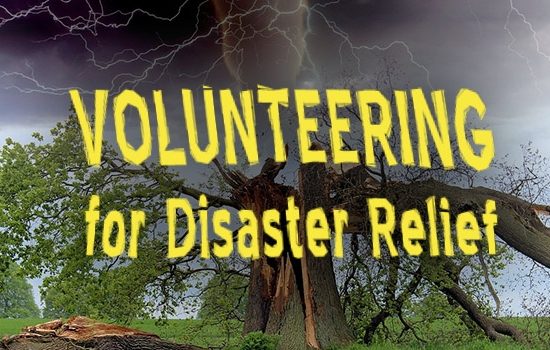LONDON (RNS) — The Rev. Alan Everett vividly remembers the early morning hours of June 14, 2017. Flames were engulfing the 24-story apartment building near his church, St. Clement’s in Notting Dale, and he did what came naturally: invite in the weary, fearful and displaced.
“Opening the doors and switching on the lights was the most important thing I’ve done in my ministry,” Everett recalled.
From 3 a.m. onward, neighbors came for hot drinks, food and clothing, all distributed by a team of volunteers who had sprung into action. In the faces of those who had lost homes, possessions or loved ones, Everett saw something rising to the surface.
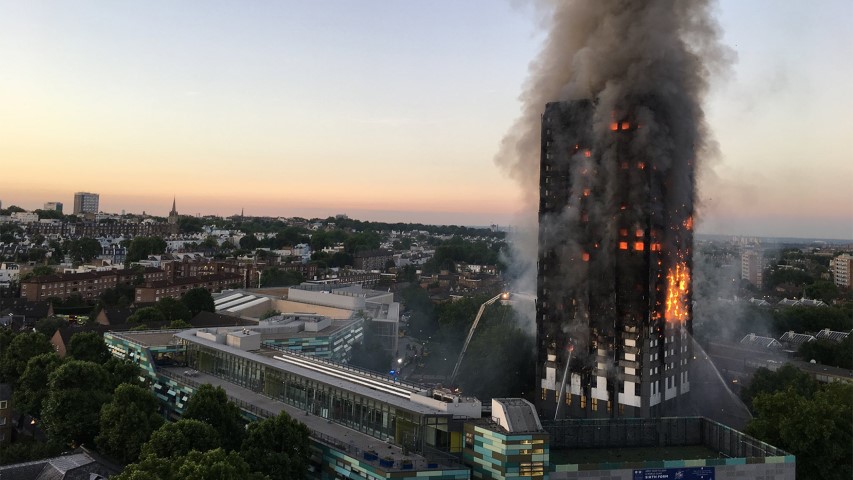 Grenfell Tower is engulfed in flames early June 14, 2017, in North Kensington in west London. Photo by Natalie Oxford/Creative Commons“On the night of the fire, something very deep was triggered in people,” Everett said. “They had a strong belief that you can find sanctuary in a sacred space. And they needed that sanctuary.”
Grenfell Tower is engulfed in flames early June 14, 2017, in North Kensington in west London. Photo by Natalie Oxford/Creative Commons“On the night of the fire, something very deep was triggered in people,” Everett said. “They had a strong belief that you can find sanctuary in a sacred space. And they needed that sanctuary.”
June 14 marks the one-year anniversary since the fire at the Grenfell Tower in the Kensington neighborhood of West London. The fire burned for 24 hours and took the lives of 72 residents, with more than 200 others left homeless.
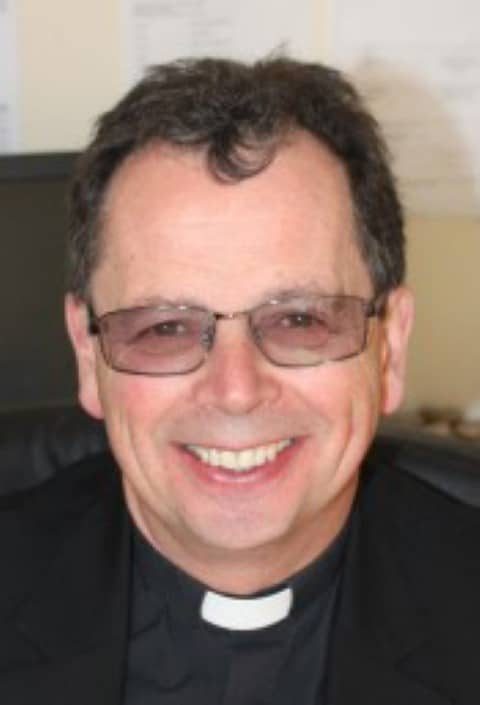 The Rev. Alan Everett. Photo courtesy St. Clement’s ChurchNow, Londoners are remembering the tragedy with a sense for what has changed over the past year. A degree of shame stems from growing awareness of causes that suggest the fire might have been preventable. But Grenfell has also produced an alternative narrative about Britain, where there is concern about integration of diverse groups in society and a view that religious belief is in sharp decline and irrelevant.
The Rev. Alan Everett. Photo courtesy St. Clement’s ChurchNow, Londoners are remembering the tragedy with a sense for what has changed over the past year. A degree of shame stems from growing awareness of causes that suggest the fire might have been preventable. But Grenfell has also produced an alternative narrative about Britain, where there is concern about integration of diverse groups in society and a view that religious belief is in sharp decline and irrelevant.
Footage of the fire shows people escaping from the flames and others screaming in distress and running away. Trapped residents can be seen standing at their apartment windows. Photos of the inferno taken from a distance show a great plume of smoke rising and curving into the air. All of the images eerily recall photos of the World Trade Center on September 11.
But what happened at Grenfell was not a terrorist incident. Evidence is emerging, especially in the past fortnight at the start of the public inquiry into the fire, that it was possibly caused by cost-cutting. Lower-quality, combustible materials were used in the insulation and cladding. The fire doors were old and not up to safety standards. The latest reports have increased the anger about the stark inequalities of life in London and the housing conditions for some of the city’s poorest who also live in one of its wealthiest boroughs.
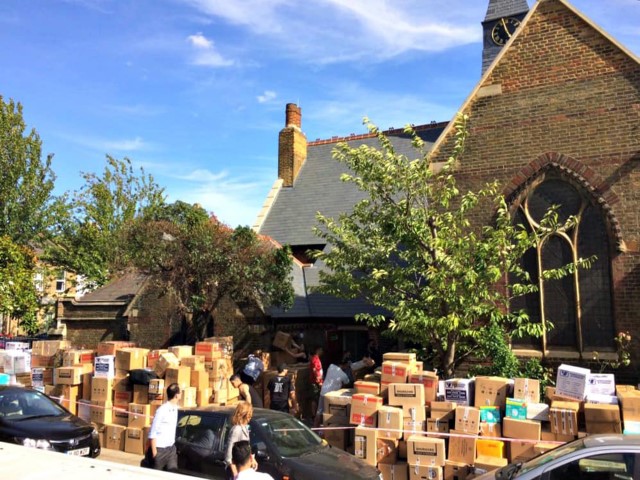 Donations are piled outside of St. Clement’s Church in Notting Dale after the Grenfell Tower file in west London. Photo courtesy Diocese of LondonRather than a place of conflict, Grenfell was home to people of many cultures and religions living together. The response to the fire revealed that religion can play a significant role in society, offering both spiritual succor and material help and encouraging community cohesion. While public services in their response to the Grenfell fire were chaotic, diverse faith groups of all kinds stood out in their commitment to the community.
Donations are piled outside of St. Clement’s Church in Notting Dale after the Grenfell Tower file in west London. Photo courtesy Diocese of LondonRather than a place of conflict, Grenfell was home to people of many cultures and religions living together. The response to the fire revealed that religion can play a significant role in society, offering both spiritual succor and material help and encouraging community cohesion. While public services in their response to the Grenfell fire were chaotic, diverse faith groups of all kinds stood out in their commitment to the community.
“The key issue was trust,” Everett said.
Trust was a major theme of a research study published this month (June) by the Theos, a London-based think tank that studies the role of religion in society. It found that 15 different faith communities responded to the emergency. Churches, mosques, synagogues, gurdwaras and others offered help that was fast, practical and pastoral. They also provided aid, advice and space for prayer and interfaith memorial services. The Theos report concluded that faith communities that helped Grenfell were trusted because they were long-established and perceived as committed.
Everett believes that the help faith groups have offered to people affected by the fire arises from what he calls “a patient ministry,” working for years with people who had been marginalized in society and being willing to learn from them.
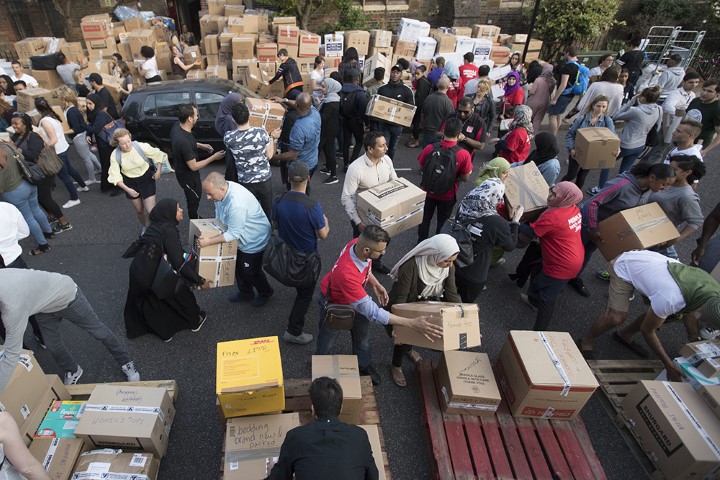 Volunteers organise donations near Grenfell Tower in west London, on June 15, 2017. A massive fire raced through the 24-storey high-rise apartment building in west London the day before. (AP Photo/Tim Ireland)The faith groups’ work has continued long after the emergency services left. They have offered people spaces to pray and provided counseling. Many people rendered homeless by the fire are still living in hotels. Congregations have joined together to put on a Christmas meal and holiday camps for children. One of the local aid organizations, the Clement James Centre, adjacent to the Grenfell Tower, was set up 40 years ago by the parishes of St. Clement and St. James. The center estimates it has supported more than 200 households impacted by the fire.
Volunteers organise donations near Grenfell Tower in west London, on June 15, 2017. A massive fire raced through the 24-storey high-rise apartment building in west London the day before. (AP Photo/Tim Ireland)The faith groups’ work has continued long after the emergency services left. They have offered people spaces to pray and provided counseling. Many people rendered homeless by the fire are still living in hotels. Congregations have joined together to put on a Christmas meal and holiday camps for children. One of the local aid organizations, the Clement James Centre, adjacent to the Grenfell Tower, was set up 40 years ago by the parishes of St. Clement and St. James. The center estimates it has supported more than 200 households impacted by the fire.
The anniversary of the Grenfell Tower fire promises to be a painful day for the bereaved. St. Clement’s will hold a 24-hour vigil beginning on June 13. The congregation is asking the community to join in prayer and solidarity — a word that has become synonymous with the faith groups of Grenfell.

